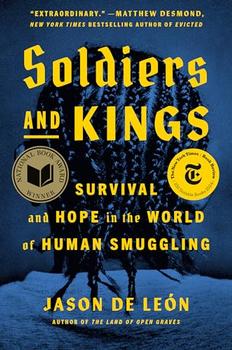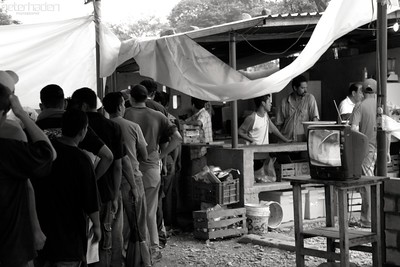Summary | Excerpt | Reviews | Beyond the Book | Read-Alikes | Genres & Themes | Author Bio

Survival and Hope in the World of Human Smuggling
by Jason De LeónThis article relates to Soldiers and Kings
 For seven years, anthropologist Jason De León followed low-level smugglers to understand the motivation, culture, hopes, and dreams of those guiding migrants to the US-Mexico border and beyond. De León documents their stories, some of which ended in death, in Soldiers and Kings. While his work is centered on the smugglers, a fuller picture of today's Central American migrants and the danger they encounter when they flee their home country emerges.
For seven years, anthropologist Jason De León followed low-level smugglers to understand the motivation, culture, hopes, and dreams of those guiding migrants to the US-Mexico border and beyond. De León documents their stories, some of which ended in death, in Soldiers and Kings. While his work is centered on the smugglers, a fuller picture of today's Central American migrants and the danger they encounter when they flee their home country emerges.
Migrants are at the mercy of gangs whose presence dominates the trail to the US-Mexico border. One of the first stops for migrants entering Mexico from Guatemala is an enclosed structure called "the chicken coop." Doesn't matter if you are walking, or a passenger in a van or bus, the cartel controls the road. The migrant, against their will, and frightened, is held until money is paid. The cartel may be accommodating. They may take the person to the bank to get the money, but they have to be compensated. Once they are paid, the migrant has their photo taken, their skin stamped as a receipt. If stopped again, they have to show their "stamp" but they are also advised to wash it off before being stopped by other gangs along the trail.
The treacherous terrain can become complicated during difficult weather seasons, exposing the migrant to sickness. The humidity of the jungle is oppressive. The traditional way to the border is to follow, undetected, a network of Mexican freight trains, and sometimes the walking is for hours beneath the hot sun or in the rain and through black mud.
Jose Mirabel tried to flee Honduras in 2006. He climbed atop La Bestia (The Beast), the series of freight trains that lurch across Mexico. But Mirabel fell. His foot had to be amputated. He decided to try again in 2021, when part of his journey was documented by TIME magazine. In recent years, pressure from the United States has caused Mexico to discourage freight riders with additional checkpoints, which puts migrants increasingly at the mercy of smugglers to get to the border.
Coordinated smuggler trips are documented in De León's story. "They march through blistering days and humid nights. They memorize the backs of their companions' heads, and their gaits. They watch their shoes disintegrate in real time. When sleep comes, it's restless and in roadside ditches and behind chicken coops. So much stopping and hiding and waiting for unseen villains to pass…They start to question those in charge. Concern is expressed about the money they have shelled out for a trip that was supposed to be three days and is now turning into a week."
Even a successful journey doesn't always mean a successful end. Migrants who reach the Texas border must shell out an additional three grand, according to De León's account, and then are left at a "stash house" where they wait to be picked up and taken deeper into the US. In 2024, Julio Cesar Quiros charged migrants a $7,000 smuggling fee, part of which was to take them from El Paso to a stash house and then drive them to Albuquerque. But the stash house was raided by the Border Patrol and Quiros and others were indicted.
Deported migrants return to their home country. Or remain in Mexico and the cycle begins again along the treacherous path of cartels, dicey weather, and bad actors preying on the vulnerable, who hope for a future and for the kind of freedom native-born Americans take for granted.
Central American migrants in southern Mexico
Photo by Peter Haden (CC BY 2.0)
Filed under People, Eras & Events
![]() This article relates to Soldiers and Kings.
It first ran in the January 15, 2025
issue of BookBrowse Recommends.
This article relates to Soldiers and Kings.
It first ran in the January 15, 2025
issue of BookBrowse Recommends.
These are not books, lumps of lifeless paper, but minds alive on the shelves
Click Here to find out who said this, as well as discovering other famous literary quotes!
Your guide toexceptional books
BookBrowse seeks out and recommends the best in contemporary fiction and nonfiction—books that not only engage and entertain but also deepen our understanding of ourselves and the world around us.